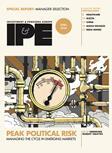The birth of the single currency has brought about significant changes to the investment process of European fund managers. Adrian Farthing of Hill Samuel Asset Management explains why
The Euro is now almost six months old and has so far struggled to live up to its pre launch billing as a viable strong alternative currency to the dollar. In dollar / deutschemark terms it is now trading at a level that is close to its weakest point in 10 years. A steady number of factors such as the Kosovo crisis have not helped to instil confidence in the new currency. The recent decision to permit the Italian government to have a larger budget deficit than that which was laid out in the original Maastricht agreement has also contributed to the erosion of its credibility. Ultimately, it seems quite likely that if this weakness continues, much of the good work that has taken place over the last few years could be undone. In the light of this possibility, it is the intention of this article to examine the consequences that this would have for European stock markets.
If we look at Table 1, we can clearly see that in the three years before the Maastricht Treaty was signed, the correlation between the performance of the different European stock markets was not very close. The reason for this was that the individual econ-omies of the region were at different stages in their cycles. A number of countries such as Germany were beginning to feel the bite of recession. Coupled with these economic problems, many of their stock markets were overexposed to areas, which were particularly vulnerable to increases in interest rates. Consequently, as monetary policies were tightened their equity markets started to run into difficulties.
Other countries such as the Netherlands, France and the United Kingdom managed to weather the storm as their economies were less exposed. Companies in these three countries continued to enjoy a relatively high level of earnings stability. The make up of their stock markets, in terms of the weightings of each sector, were also very similar and as a result they performed pretty much in line with each other.
Since the principle of monetary union was agreed upon, European stock markets have increasingly come into line with each another. Unlike in 1992, when the stock markets of countries such as the UK and Sweden were poles apart, Table 2 shows that they now behave in a much more similar manner.
This has happened despite the fact that the UK is not yet in the single currency. In anticipation of its entry into EMU, UK interest rate policy has been brought in line with that of the rest of Europe. This can clearly be seen when we look at the narrowing of interest rate differentials between the two economic areas. Whereas in 1996, the spread between the yields of UK and German 10-year bonds was almost 200 basis points, this figure now stands at 69 basis points and seems set to narrow further as economic convergence continues in the run up to the sterling joining the single currency.
This change of behaviour has had a most significant impact on the manner in which professional investors now approach European stock markets. Rather than looking at them on a country by country basis, we now scrutinise sectors on a continent wide basis.
Therefore, it is more important to pick the right balance between growth and value stocks and large and small companies rather than particular country weightings. At Hill Samuel, we were among the first pioneers of this pan-European approach. All of our European research and analysis is carried out on this basis. As a result of this approach, our portfolios have been able to achieve more stable returns.
Looking ahead over the next couple of years, UK GDP appears set to rise from 0.8% this year to 2.0% in 2000, while the German economy is expected to grow by 1.6% in 1999 and by 2.5% next year. Forecasters predict that UK inflation will fall slightly from 2.3% to 2.2% and that German inflation should rise from 0.7% to 1.6% over the same time periods. This shows that further convergence in economic terms appears to be quite likely. This should lead to the stock markets of each country performing more in line with each other than ever before.
In order to continue to achieve this stable consistent growth across Europe, the underlying economies need to be kept firmly in control and in line with one another. Already, we see that the certain economies, most notably Spain and Ireland are growing more quickly than those of their neighbours. For example, the Irish economy is estimated to be growing by in the region of 9.0% a year, which is over three times that of the European average. The danger is that it could become politically inadvisable to do so as there are now so many coalition governments in place across Europe, that further political uncertainty can not be ruled out.
Too many similar decisions to the one concerning the Italian budget deficit would also do nothing but heighten reservations about the wisdom of EMU. If such negative sentiment were actually to take hold, it would not be too long before the region’s stock markets would start to suffer. On the other hand, if control is kept and the situation is managed correctly, those prepared to invest in the region should benefit greatly from its stability.
Adrian Farthing is head of Continental European equities at Hill Samuel Asset Management












No comments yet